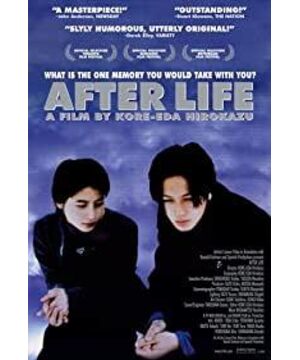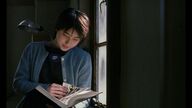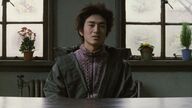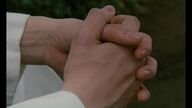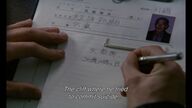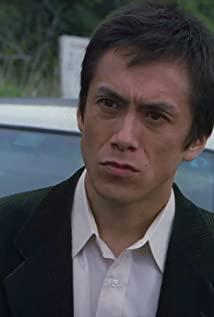It is Hirokazu Kore. This name may be familiar to some friends who like to watch family and family movies. This is a Japanese director who has won several Cannes awards. We can learn from his "The Thief Family" in recent years. ” and “Like Father Like Son”, I see the warm family affection under the director Hirokazu Koreeda. And when you turn to a movie called "The Next Stop, Heaven" from twenty years ago, and then recall the dull happiness in "Never Stop" after him, and then open "Like Father Like Son" The kind of pure family love, and looking back at the family relationship in "The Thief Family", you will find that his movies can always reflect the real quiet life, bringing us a different kind of truth, goodness and beauty between people . What kind of charm does his film have and what kind of emotion does it bring us, so let us take these questions and walk into the station from heaven under the director Hirokazu Koreeda.
The film "Next Stop, Heaven" was filmed 20 years ago. It was starred by Iura Shin, the Doctor Nakatang in "Unnatural Death", which was a big fire before, and Oda Erika, Terajima Shin and others. There is also a book of the same name, which is based on the film and was published six months after its release. In the film's story, it's a quiet station where the dead come on Mondays, choose their favorite memories for a few days, and watch their A memory from the past, take this best memory to heaven. In this film, it was Director Hirokazu Kore-eda who told us with those personal shots: the memories of those characters - it can speak, telling us those ordinary but profound stories, from the ordinary memories , Let the deceased sigh that they have no choice, and are very entangled. Every little thing that used to be ordinary, those experiences that he used to be inconspicuous, seemed very important at that moment. The story is simply described, and the emotions are quietly paved. This is the style of Hirokazu Koreeda. Instead of using a bunch of miserable environmental descriptions to pave the way for the story, it just uses the deceased to tell their various pasts and create a warm atmosphere. This kind of atmosphere, whether in his films, in the book of the same name he wrote, or in his later films, this emotional rendering can always touch the heart.
Among them, the elegant and dignified Ms. Todoro danced for her brother when she was a child, Mr. Zhuangtian's "driving" uncle's greasy, Mr. Kaneko's nostalgia for taking the tram on his way from middle school, and the youthful rebellion of Ise Valley, Ms. Shanjiang and her fiancé left on the bridge like a blue bridge. Mr. Nakamura exchanged his watch for a chicken when he was captured. Ms. Yoshimoto was comfortably lying on her mother's lap to dig her ears. When I was eating rice balls with my mother in a bamboo forest, Mr. Buntang was in the comfort of his baby when he was six months old, Mr. Watanabe and his wife watched the last movie in the afternoon, Mr. Kojima’s first and only flight in an airplane Experience, and mother-in-law Nishimura had already chosen the memory of her nine-year-old before her death. Director Hirokazu Koreeda did not use too many details, but just used a simple dialogue to tell the story of everyone's memory and describe everyone's emotions. . In the end, with the cooperation of the staff, the stories of these multiple people will be interpreted as much as possible at the time, and then in the old theater, they will become the same story - the next stop, the kingdom of heaven.
In the film, the characters are very delicately created. Watanabe found that Mochizuki was the emotional line of his wife's fiance who died in the war many years ago, Mochizuki's emotional line of memory of Kyoko, Kawashima and Nishimura's mother-in-law recalled the emotional line of his daughter, Assistant Poem Ori and his colleague Mochizuki's emotional line, as well as those that tell about the journey of others looking back on their lives after death, the intertwining of life and death, and the emotional lines of those good times that slowly flow by.
The weaving of these emotional lines makes the warm emotions in the movie emerge spontaneously, and the main theme of this book is just as director Hirokazu Kore-eda said: "After wandering for more than 50 years, it was only yesterday that I realized that I was once someone else's happiness. part of it." In fact, have we ever been part of someone else's memory? We were born in a family and brought family memories to our parents; we were in school and brought memories of friendship to our classmates; when we started to grow up, we left our memories in various places, you go anywhere As you go, you will find the memories you have left behind. And these more or less memories are exactly the meaning of the memories under the lens of director Hirokazu Koreeda.
What is memory for us? Memories are the traces of our growth. We started to grow up step by step, and we left a memory step by step. There are deep, happy, and sad. But it is understandable, that is the mark of our existence, and those are the footprints of our growth. In this film, the memory of good memories and the forgetting of other memories, these two opposites, reflect the director Hirokazu Koreeda's view of death in memory, Nabokov said: "Memory is the only real asset. "And those who don't want to forget those memories, those who want to keep their memories intact, will stay and become one of the staff at the Tianguo Station. In the movie, Mochizuki began to understand the life of his former fiancée because of his contact with Mr. Watanabe. With Shiori's encouragement, he found out the memory that his fiancée Kyoko chose. When he found out that his fiancée Kyoko chose the last one The afternoon he spent with him, he suddenly felt like he had suddenly let go of what he had been carrying for decades, but he - chose to leave with the memories in the station.
After Mochizuki and Shiori watched the still moonlight together, Shiori had a crush on Mochizuki, but he didn't say a word at that time, just like Gu Cheng's "In Front of the Door": "The grass is knotting its seeds, and the wind is blowing. Shake its leaves, we stand, don't speak, it is very beautiful, there is a door, no need to open it", the stationmaster Nakamura came to Shiori's room and told her that the moonlight was really beautiful, and told her euphemistically that she should go after him , However, later on, she also missed him.
There is such a scene in the movie, Shiori returns to the real Japanese streets, the streets are full of traffic, Shiori is walking on the road, but she finds that she can't fit into this place at all, as if she has never been there, as if she died during these hours , the shadow of her once disappeared without a trace, just like she never lived in this world.
The movie tells about death in such a way that one is Shiori being forgotten, while the other is Mr. Kawashima who always remembers his daughter. This contrast shows us whether death in the true sense is like medical brain death, or is it medical brain death? As in "Dream Hunting Travel Notes", the shadows of our relatives left in our memory are gone. We can't remember the names of relatives, and the shadows of relatives are no longer in our memory, and we begin to forget which relatives. The imprint of the road that the relatives have traveled, such "death". It was Director Hirokazu-eda who didn't say it clearly in the movie, but in the scene from Shiori's return to society, her helplessness and loneliness, people came and went, but no one stopped to stop and talk to her, thus seeing her helplessness and loneliness. death in the true sense
In this film, there are many stories in the station of heaven, it tells each different memory, both joys and sorrows, clutches, or affection, or hurt. Just like Mochizuki before he left, the last moment of looking at each other gently left his memory in her.
At the end of the story, just like the beginning of the story, the journey to the station of heaven is still going on.
View more about After Life reviews


